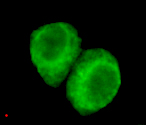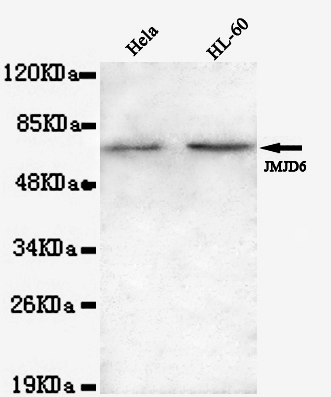-
Product Name
Anti-JMJD6 (3G5) Mouse antibody
- Documents
-
Description
JMJD6 (3G5) Mouse monoclonal antibody
-
Tested applications
WB, ICC/IF
-
Species reactivity
Human
-
Alternative names
Apoptotic cell clearance receptor;Bifunctional arginine demethylase and lysyl-hydroxylase JMJD6;Histone arginine demethylase JMJD6;JmjC domain-containing protein 6;JMJD 6;JMJD6;JMJD6_HUMAN;Jumonji domain containing 6;Jumonji domain-containing protein 6;KI antibody
-
Isotype
Mouse IgG1
-
Preparation
Antigen: Purified recombinant human JMJD6(N-terminus) fragments expressed in E.coli.
-
Clonality
Monoclonal
-
Formulation
Purified mouse monoclonal in buffer containing 0.1M Tris-Glycine (pH 7.4 150 mM NaCl) with 0.02% sodium azide 50% glycerol
-
Storage instructions
Store at 4°C short term. Store at -20°C long term. Avoid freeze / thaw cycle.
-
Applications
WB: 1/1000
;ICC: 1/200
-
Validations

Immunocytochemistry of HeLa cells using anti-JMJD6(N-terminus) mouse mAb diluted 1:200.

Western blot detection of JMJD6(N-terminus) in Hela and HL-60 lysates using JMJD6(N-terminus) mouse mAb (1:1000 diluted).Predicted band size: 46KDa.Observed band size: 62KDa.
-
Background
Swiss-Prot Acc.Q6NYC1.This gene encodes a nuclear protein with a JmjC domain. JmjC domain-containing proteins are predicted to function as protein hydroxylases or histone demethylases. This protein was first identified as a putative phosphatidylserine receptor involved in phagocytosis of apoptotic cells; however, subsequent studies have indicated that it does not directly function in the clearance of apoptotic cells, and questioned whether it is a true phosphatidylserine receptor. Multiple transcript variants encoding different isoforms have been found for this gene.
Related Products / Services
Please note: All products are "FOR RESEARCH USE ONLY AND ARE NOT INTENDED FOR DIAGNOSTIC OR THERAPEUTIC USE"
